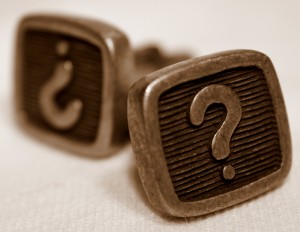Today’s post is inspired by Matthew Lee Anderson’s new book, The End of Our Exploring. I had the chance to read and endorse the book a few months back and highly recommend it to you as one of the best on where questions and doubts fit within a life of faith.
Special Offer: Anyone who buys a copy of the book this week will be able to give a free copy of the ebook to a friend. Learn more here.
—
I like asking questions. Or should I say, I like questioning. Or should I say, I like questioning the things I believe to be worth questioning.
I have a limited amount of tolerance for the questions other people ask. That is to say, question too much, and I’ll question you.
I see the importance of asking questions. Sometimes the questions I ask aren’t even in search for an answer, but in search of the freedom that questioning well allows. But, I have limits on my opinion of questions being a good thing.
In my preference for control, and lack of change (or if change is necessary, I want to instigate it), I slowly shun those who begin to view the world in a way different than mine. I can always tell by their questions. It’s as if they question by trying to get away from what they’ve always thought was the answer. “Faith needs a place for doubting,” they tell me.
I’m fine with my own questions, but yours I have some issues with. This makes me selfish.
Or does it?
Is there more to questioning than just the growing tide of opinion that says questioning is good? Is it possible to question poorly?
I, like you, question to know and be known. But I question with those I trust, because my questions open my chest and show you my beating heart. All my insecurities, all my false arrogances—they show up in my questions. But not all questions are created equal. Where is it we intend to travel with our questions? Doubts? Faith?
T.S. Eliot lays out an answer for us:
And the end of all our exploring
Will be to arrive where we started
And know the place for the first time.
Yes, questions can be better or worse, because too many questions have so little to do with an end to exploring. We question to stir the pot. We pose fake questions as a facade, covering up our real questions. Question then becomes a form of political posturing: how can we one up those around us?
In answer to this post’s question of, is my question better than yours? I say no. Doubting, exploring, and questioning are part of the journey to the place we long to arrive: a place where we know and are known. A place where we see Him face to face and questions lose their place.
Questions that lead there will always have a place in a life of faith. They take us beyond our doubts and allow us to develop a faith fixated on the day when our exploring with end with a Person.
In this process of being open to questions, we’ll find ourselves giving up easy answers, which are rarely answers in the first place. “If we want people to think adult thoughts, then we should stop catering to their felt needs for quick answers,” says Matthew Lee Anderson.
Open up your chest. Show your beating heart. Expose the insecurities oft hidden.
Bring up your questions, in hopes of a day when the Answer will arrive.


Pingback: "Is My Question Better Than Yours?" by Tyler Braun | Notes from Mere O()